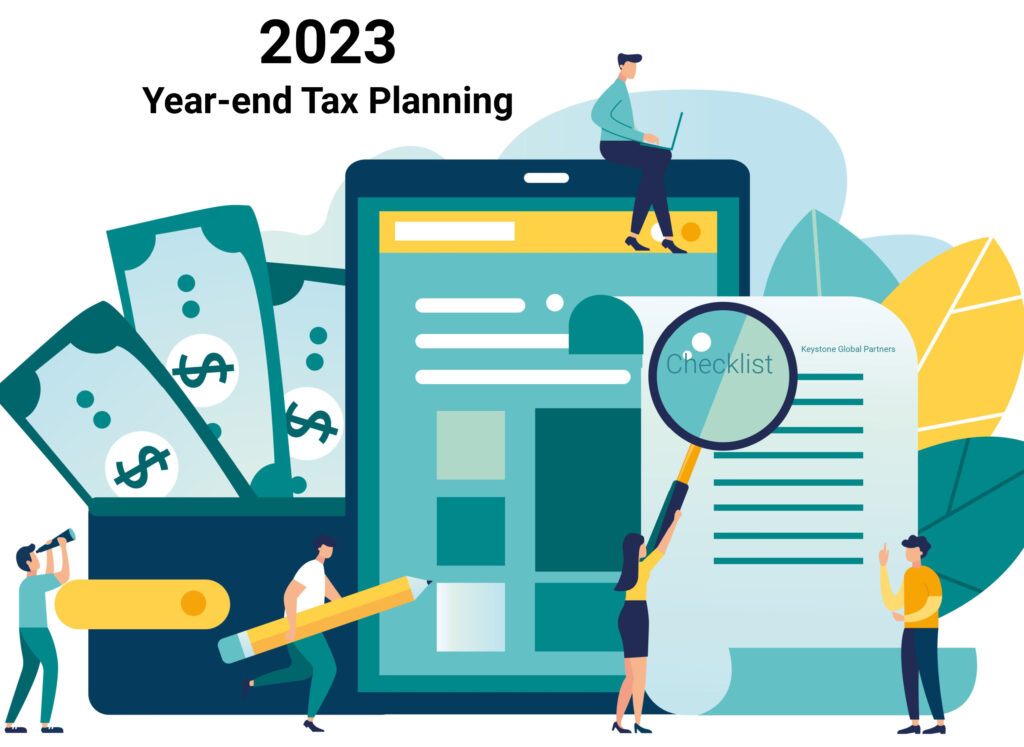As we approach the end of the year, it’s important to consider various tax planning strategies to optimize your tax liability and tax bill. Below, we outline some of the planning items we review with our clients during their year-end tax planning meetings. Please note that this is not a comprehensive list. These considerations pertain to federal income taxes only and do not encompass state or municipal laws. We recommend discussing the items below with your tax advisor before taking action. There may be other more substantial tax strategies based on your individual situation.
Tax Projections and Taxable Income Planning
- Collaborate with your financial and tax advisor to develop preliminary tax projections and pro forma tax analyses.
- Assess whether it’s advantageous to accelerate or defer taxable income and expenses based on adjusted gross income, tax bracket, and income tax liability.
- Review projected income taxes and whether adjustments to income tax withholding or estimated payments are necessary.
- Examine tax brackets to determine if you or your family members can benefit from the 0% or 15% Long-Term Capital Gains tax rates or lower brackets for additional tax savings.
Review Investment Gains and Losses / Harvest Losses or Gains
- Evaluate realized and unrealized gains/losses. Identify tax losses to offset capital gains or gain harvesting opportunities.
- If needed, sell securities by year-end for tax loss harvesting or tax gain harvesting
- Note that the deadline to “double up” a position to avoid a wash sale is November 28, 2023.
Charitable and Family Gift Tax Planning Strategies
- Complete any charitable donations by year-end. Keep in mind that your tax deductions may be limited by your AGI. Consider donating appreciated long-term stock instead of cash.
- To control charitable tax deduction timing, consider using a Donor-Advised Fund or foundation instead of an outright gift.
- Determine whether bunching donations makes sense if you are close to itemizing.
- Finalize gifts to family members or individuals by year-end. The annual gift tax exclusion for each individual is $17,000 for 2023, which is the amount of money you can gift to any one individual, tax free, per year. Married couples can double this amount given via gift-splitting.
- Consider whether qualified charitable distributions are suitable if you are 70 ½ or older.
Maximize Retirement Plan Contributions
- Make the maximum allowable contributions to your employer retirement accounts.
- Fund and convert your Backdoor Roth contributions before year-end to align with the associated tax year. For Traditional IRA and Roth IRA contributions, note that the deadline is April 15, 2024.
Education Savings
- Evaluate the possibility of creating or adding funds to education savings accounts. Assess whether super funding vs. annual gifting makes sense.
FSA or HSA Contributions
- Consider contributing to a Flexible Spending Accounts (FSA) or Health Savings Accounts (HSA) during your employer’s annual benefits enrollment period.
- Consider using HSA for long-term investing.
Stock Options Evaluation
- For individuals with company-granted stock options, assess whether it’s the right time to exercise or disqualify them.
Avoid the Following
- Avoid purchasing new mutual funds with expected large year-end capital gains distributions.
- Be mindful of wash sale rules during tax-loss or tax-gain harvesting.
2025 Wealth Transfer Considerations
- Explore opportunities for long-term tax minimization. The estate tax rate is 40% on assets above the lifetime exemption amounts, which currently stand at $12.92 million per person ($25.84 million for married couples). This exemption may decrease to approximately $6.5 million per person ($13 million per married couple) on January 1, 2026, unless Congress takes action before that date. For families with substantial wealth, various advanced gifting strategies can be considered using irrevocable trusts.
Please don’t hesitate to reach out if you have any questions. 2024 Federal Income Tax Brackets and Inflation Adjustments can be found here.


